#i know crowley isn't a man but david tennant is so the point still stands
Text
how am i supposed to function whilst knowing this level of gender exists and i can't have it

#good omens#crowley#anthony j crowley#anthony janthony crowley#gender envy#david tennant#how is this even fair#i see a man with a half up bun and it is over for me#it's literally always the man bun#i know crowley isn't a man but david tennant is so the point still stands#although crowley not being a man probably helps in this situation#genderfluid#nonbinary#queer#trans#gender is a scam#i want nothing more than to be a silly goofy gender thief
685 notes
·
View notes
Text
Okay so I watched Inside Man on Netflix. It's interesting. More importantly, it's a masterclass in crafting likeable characters and how the POV we follow in a scene affects the way we see a character. Also, this somehow relates to the Star Wars Prequels, I promise! 😆
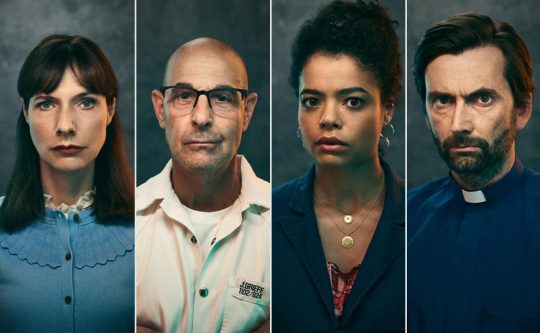
The moral of the series is that "everyone is a murderer, all it takes is a good reason and a bad day." The main characters are:
A vicar who - through a huge misunderstanding - has now locked his son's tutor in his basement and doesn't know how to get out of this situation, played by David Tennant.
A convicted murderer and ex-criminal psychology professor who solves crimes from his cell, as he waits for his execution, played by Stanley Tucci.
So a man who locked a woman in his cellar and a guy who murdered his wife. In any other movie, these guys are the villains. Yet, both of these characters are extremely likeable!
This is achieved through how relatably they behave in their relationships (kind, humble, humorous)...

... and through the emotion and/or charisma brought by the actors playing them (it's THE DOCTOR/CROWLEY and Stanley Friggin' Tucci)... but also through the amount of screen time they get.
We're with them for most of the show. There's other characters (the journalist, the trapped tutor and the vicar's wife) and subplots, of course, but they're our two anchors.
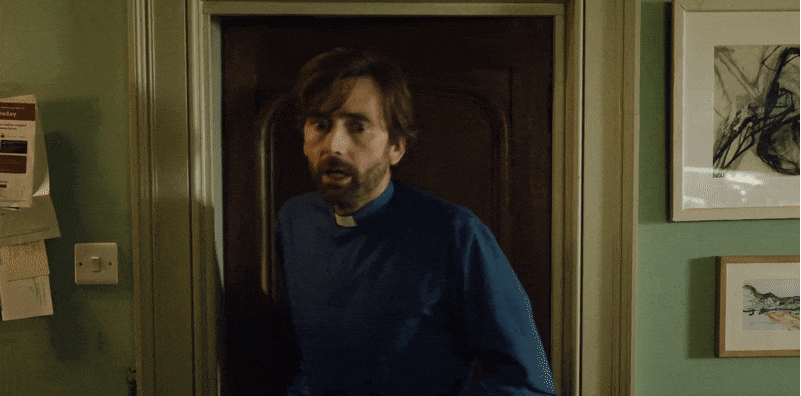
So when I'm watching David Tennant lock his son's tutor in his cellar and consider if he should free her - only to see him and his wife make things worse - I'm not thinking "you monster" like I do when I see Buffalo Bill in Silence of the Lambs for example.
No, I'm thinking "goddammit vicar you're making things worse, it'll come back to haunt you, there's still a chance to turn back, please!" I'm rooting for him to make the right choice because I'm seeing him struggle and despair and hesitate throughout many scenes.

When I'm watching Stanley Tucci guiltily say he deserves death, after being so darn charming, humble and in clear possession of a moral compass, my instinct as a viewer isn't to go "he's right".
It's to go "aaaw, no it's fine, everyone makes mistakes."
And these characters remain likeable and/or relatable for a huge chunk of time... until, every once in a while, the show reminds you that, "remember, these guys are criminals."
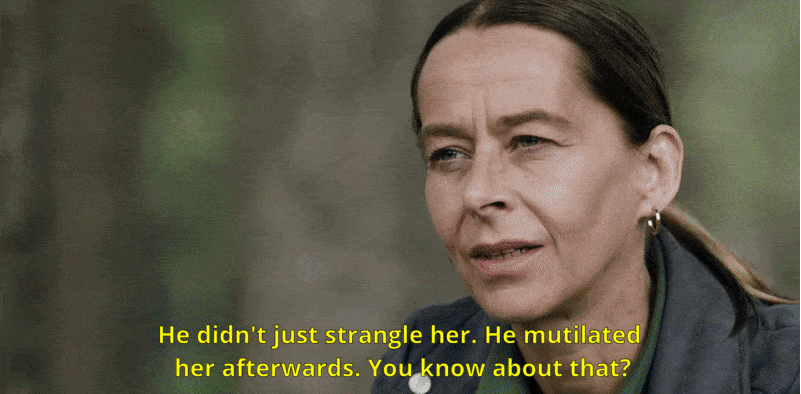
"One of them's killed his wife then decapitated her, and the other one is contemplating murder, so they did/are doing evil stuff, they're the villains and you shouldn't grow fond of them."
Then it goes back to making you empathize with them again.
It's quite the emotional roller-coaster, very intriguing yet frustrating, which I have to guess is exactly what the show is going for.
But the point is: the amount of time we spend with these characters is partially what elicits this emotional reaction out of us.
If we consider the tutor's character:
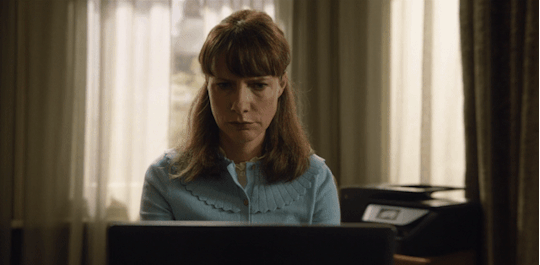
For all intents and purposes, we should feel sorry for her, or full-on fucking love her. Objectively-speaking, she's:
smart but obviously scared,
we establish early on that she has a brave heart and stands up for oppressed women,
she thinks she's trapped by a pedophile or a man defending a pedophile, figures he'll inevitably try to murder her, yet manages to stay resourceful, determined and cool-headed despite it all.
She's an absolute superhero.
But that's not how the narrative frames her.
She's framed as an antagonistic force, in the vicar's subplot.
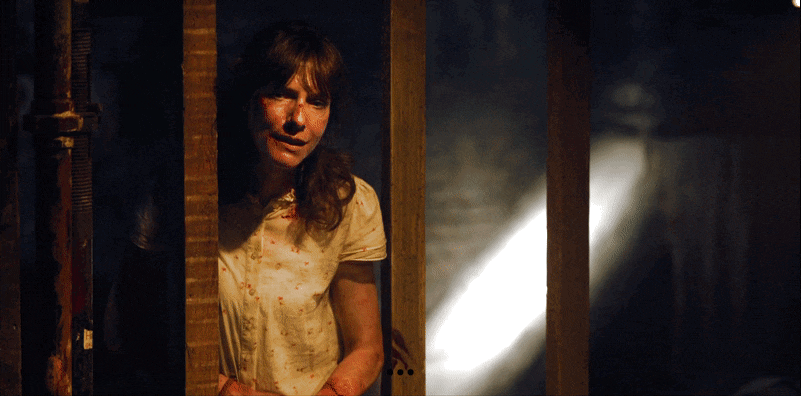
She may be the one tied up in a basement, but she's in control and the vicar is not. She's almost framed as being in a position of power (when she's really not), which leads the audience to view Tenant's vicar as an underdog.
When the vicar is trying to look for alternatives to end this situation so that he doesn't have to kill her, she's unhelpful,
and even starts pitting the vicar and his wife against each other.
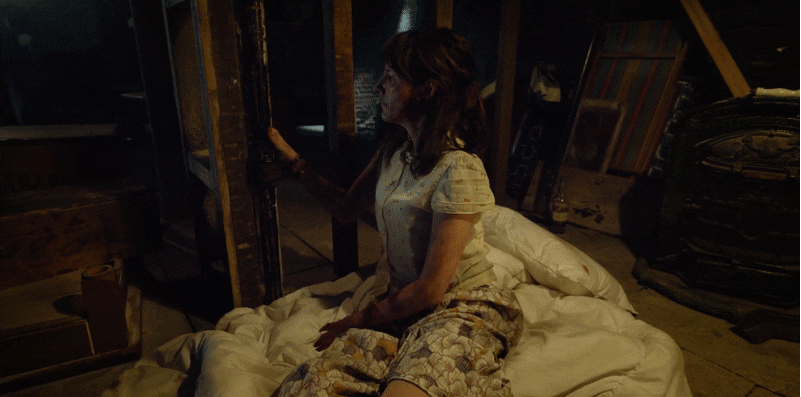
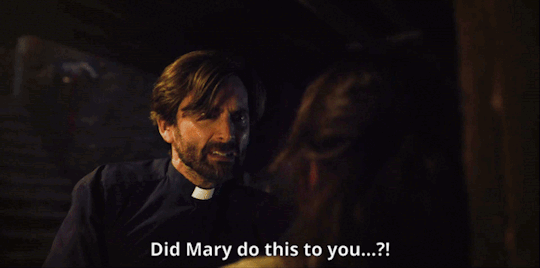
Again, in-universe, she's scared shitless and in "fight-or-flight" mode. She's putting up a front because she's just trying to get outta this alive. She's the victim, here, not the vicar who captured her.
But as a viewer, you don't feel that, despite objectively knowing that. Why and how?
Because we barely see this character, compared to Tenant's vicar. So we have more time to grow to feel for him. There's "why".
Also 90% of what we do see of the tutor is her being aggressive, manipulative, sometimes downright merciless and we're seeing her from the POV of the vicar or the vicar's wife. There's "how".
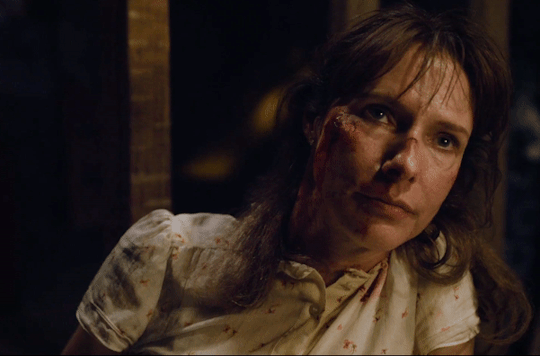
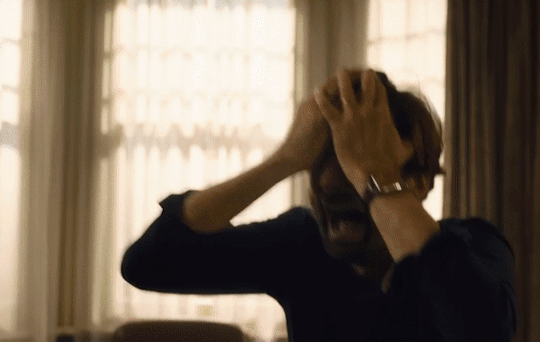
Result: the viewer feels sorry for the captor and frustrated towards the captive.
This isn't a rational reaction, it's an emotional one (the goal of any visual artform being to get an emotional reaction out of the viewer).
Which means the series and Stephen Moffat effectively did their job.
How does this relate to the Prequels?
Well, a lot of people see the Jedi in a negative light in the Prequels, and Anakin in a more sympathetic one.
Even though the Prequels are about how a good man becomes bad, and even though the Jedi embody one of the major Star Wars themes (selflesness) as opposed to Anakin who clearly displays the anti-theme (selfish)... a majority of fans feels more for the latter than the former. Why?
Because the Prequels unintentionally do what Inside Man does purposefully. You react to Anakin like you react to the vicar. You react to the Jedi like you react to the tutor.
Simply put: Anakin has more screen time than the Jedi.
And we don't just see him more, we see him struggle, we see him about what he knows to be morally right vs what he really wants, we see him be overtaken by his own fear...

... and just by contrast, that makes him more relatable than the Jedi, who have already overcome their character arcs and mostly all learned to keep their flaws in check.
The narrative doesn't intend to frame them as antagonistic. We do see them talk about how worried they are, we do see them emote.

And if you think about it, it's easy to see why:
their entire way of life is going to crap,
their values are being corrupted as they're forced to fight and die, alongside their clone brothers, in a war they wanted no part of,
they sense that the Force is close to the breaking point and that the galaxy's inhabitants are suffering on the daily.
But, for example, when Mace or Ki-Adi Mundi are shown expressing concern in the Prequels... as worried as they are, in-universe... out-of-universe, their measured reactions doesn't emotionally impact a viewer as much as Anakin's intense ones do.




So a big chunk of the audience will sympathize more with him than them. But like the tutor in Inside Man, the Jedi are objectively the victims and Anakin is objectively an unstable space-nazi who betrayed and destroyed them.
Just because we're not shown these characters be worried beyond just monotonously saying "I'm worried" doesn't mean they're not actually worried as Anakin is in Revenge of the Sith (if not more).
However we don't see it.
Because these three films aren't about the Jedi Order, they're about the Republic and about Anakin and about how each of these two beautiful things were corrupted (by Palpatine and by themselves) into becoming the very thing they stood against.
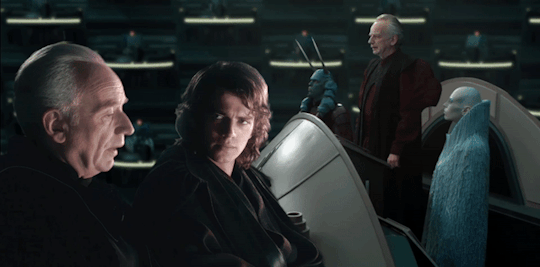

The Jedi aren't a factor in either of those two themes set up by George Lucas.
They became a factor when fans - who despite not liking the Prequels, still admirably chose to engage with the material - made the Jedi be more important to the narrative of the Prequels by re-framing these films as "The Failure of the Jedi".
Now, should Lucas have recognized that most fans wouldn't give two shits about why a Republic falls or the "matinee serial" format, and would've rather he focused on the Jedi, and developed them accordingly? Probably.
But good luck telling an indie filmmaker with a bunch of money how to tell the story he wants to tell.
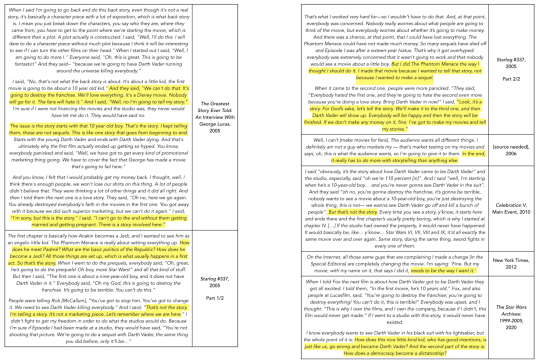
Could Lucas have done more with the Prequels to highlight the fact that the Jedi are the underdogs of the story, not Anakin's oppressors? Yes.
But, firstly, he probably didn't think that was a point that needed explaining. And secondly, as he explained at Cannes, in 2002, feature films are a very limiting format to tell a story, especially one of the Prequels' scale. If it doesn't directly contribute to the story you're telling... it's gotta go.
A limited show would've been better to cover every aspect of the Prequels more in detail and avoid confusing the audience re: who they should be rooting for.
Which is why it's interesting, to me, that Stephen Moffat used his limited show to INTENTIONALLY confuse the audience! 😃
#the screenwriter part of me was geeking out and I had to write this#one of my longest posts and it's about Inside Man of all things wtf#long post#discussion#star wars analysis#meta#SW Meta#Inside Man#inside man bbc#David Tenant#Hayden Christensen#harry watling#Anakin Skywalker#stephen moffat#george lucas#Jedi Order#Jedi Council#Mace Windu#star wars#revenge of the sith#star wars prequels#media#Netflix#BBC#dolly wells
575 notes
·
View notes